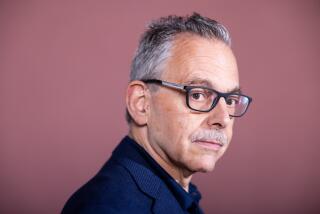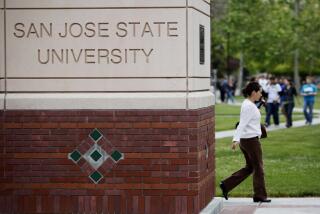Venerable SDSU Professor Leaving the Lectern, Not the Quest
- Share via
For 35 years, Henry Janssen has stood center stage in the classrooms of San Diego State University, at times patiently nurturing, at times cajoling a generation of students to understand that political science is more than an esoteric exercise in academics.
During his tenure, the longest ever for any professor at the Montezuma Mesa campus, Janssen never used the same set of lecture notes twice, never stopped trying to improve his performance as a teacher, and never lost sight of the key question that he wove through all of his courses, as a result both of his own academic training and his Depression-era upbringing in rural Kansas.
“The single thread through all of my career has been the question of how to organize society in a way that everyone can have a decent life,” Janssen said last week, conceding that fundamental answers still elude him on the eve of his retirement, as they have eluded political scientists and philosophers dating back to ancient Greece.
But the animated Janssen promises to pursue the issue even in formal retirement, laughing at his wife’s question of whether, “now that I have more time, will I get better?”
The 67-year-old Janssen has garnered a roomful of awards over the years at San Diego State, including the Outstanding Faculty Award from students in 1971 and a similar honor from alumni in 1973. He has served on many university committees and commissions, and has had two trees planted in his honor on the campus.
Accomplishments of Students
Yet Janssen professes to be awed by little of that attention, preferring instead to recall individual students whom he has encouraged to become successful as professionals in their own right.
“I got this note just the other day,” Janssen said, picking up a card from his still-cluttered desk.
“You probably don’t remember me,” the former student, now living in New Zealand, wrote Janssen. “You recommended me for the Peace Corps in 1961 and I took your political theory class in 1965-66. I will always remember your clear thinking and the problems that you proposed for discussion, especially, ‘A good citizen in a bad country is a bad person’ (from Aristotle).”
Despite what Janssen said was his mother’s admonition not to “blow your own horn,” he attributes his success at SDSU to the fact that he was “a decent teacher, a good teacher.”
“I learned that I could affect others positively while in the Army,” during World War II in Europe, Janssen said. “I found that I could take a group and teach them something they couldn’t do before . . . and that fit in with my bent to help other people by giving them the tools to do something new.
“I never have thought of myself as a ham or a performer, but rather as someone intense and caring about my work, and able to get across to my students that what I teach is essential.”
The irony about Janssen’s tenure at San Diego State is that, in all likelihood, he would not be kept on if he were an up-and-coming assistant professor today, said Albert Johnson, dean of academic
affairs for the campus. That is because Janssen has never published any of his research papers, and publication is a requirement these days on any campus as large and sophisticated as SDSU’s, Johnson said.
“If Henry came up today, he would have to promise to be a different person than he has been in the last 35 years,” Johnson said. “But, when he came here, there was no expectation of publication at any of the state universities, and thus he never had to do research to get promoted and receive tenure.
“But the nice thing about Henry is that he has been current and remains current in his field, and has been an extraordinarily good teacher, and so is perhaps the exception to the rule. . . . The hard thing for a university is not to get blinded by the rule, because you’ll miss people like Henry Janssen.”
Janssen did not start out to become a teacher, or even a political scientist. Rather, he had his eye on geology or petroleum engineering as a result of part-time work in oil fields around his home in Lyons, Kan., as a means of supplementing the earnings from the family wheat farm.
Father Killed in Depression
But, as an undergraduate at the University of Oklahoma in the late 1930s, Janssen became irresistibly attracted to political theory through various courses. The marriage of philosophy with politics and government appealed to him in part because of his Depression experiences, he recalled.
“My father had been killed when a gas tank blew up in a truck he was driving that should have been junked, while he was going into town to get a mower sharpened so my brother and I could cut the school lawn for an extra $5,” Janssen said.
“It had a profound effect on me in that I, my whole family, developed a massive social conscience. . . . It fit in with (President Franklin D.) Roosevelt and his New Deal ideas as well, that you shouldn’t let down poor people and that government could be an instrument for helping rather than oppressing.
“It was revolting to me that people had to be so poor that they would be killed in accidents like my father, and lose everything.”
Later, during his postwar graduate studies at Oklahoma and then at University of California, Berkeley, Janssen reinforced his own beliefs with those of theorists, ancient and modern.
“Plato and Aristotle knew that government could be a positive good, and that human beings are not here only for themselves but as a part of larger society,” Janssen said. “So I see politics as an instrument to do something.”
More Than Scrounging
And those are the themes he has stressed over and over with his students, both undergraduate and graduate, revealing to them the moral dimensions of society. Janssen has tried to show that life should be more than a scrounging for necessities, that people should be able to organize on a higher level of existence.
“How you do that: When must you compromise your character in a way that is demeaning, when is there a need in society for coercion and how far can education bring a betterment to society? Those are things I think about year after year, the challenge of trying to figure out why we can’t do better.”
Janssen understands that his colleagues took longer than they might otherwise to develop respect for his work because of his lack of published materials.
“If you don’t publish, people feel you don’t know anything,” he said. “I like to be thought of as a scholar; I read voraciously, I think, and I do papers, but I only give them once because the type of problems I am interested in are not those of the highly specialized type that professional journals are interested in.
“I just don’t feel that I should do research at the expense of teaching if all an article is going to do is be a footnote in some other (publication) five years from now.”
Janssen has seen San Diego State grow from a 4,000-student teachers college to a 38,000-student mega-university, and, not surprisingly, he sees both good and bad in the change.
Smaller Base of Knowledge
More and more, students in lower-division courses during the freshman and sophomore years come unprepared for political science theories previously given at those levels, Janssen said. “There is less of a common base of knowledge shared at this level--you can’t assume everyone knows about (George Orwell’s) ‘1984’ or (William Golding’s) ‘Lord of the Flies’ anymore--and so you have to first impart basic information before you can wrestle with other concepts and ideas.
“But this is going to happen in a society that turns kids out from high school unprepared and, at the same time, says they must go to college. You’re going to have more need for remedial work, but I don’t think this is normal for a university.”
Janssen recalled that, in 1953, a faculty member could know practically every one of his colleagues in all departments. Today, there is less contact, except through interdisciplinary programs such as the masters of liberal arts degree program in which Janssen participates.
“Yet I am still amazed at how many students are still able to experience a closeness with the faculty here, despite our massive growth,” he said. “I don’t think that such accessibility is possible at almost any other institution of our size.”
More to Read
Sign up for Essential California
The most important California stories and recommendations in your inbox every morning.
You may occasionally receive promotional content from the Los Angeles Times.













